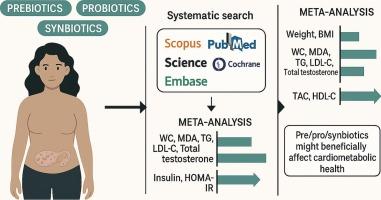The effect of pre/pro/synbiotics on cardiometabolic health in patients with polycystic ovary syndrome: A systematic review, meta-analysis and meta-evidence
IF 4
2区 农林科学
Q2 FOOD SCIENCE & TECHNOLOGY
引用次数: 0
Abstract
Although many studies have revealed the benefits of biotics on health outcomes in women with polycystic ovary syndrome (PCOS), the findings are inconclusive. Scopus, PubMed, Web of Science, Cochran, and Embase were searched to identify RCTs on prebiotics, probiotics and synbiotics on health outcomes. Results of twenty-one RCTs showed high-quality evidence supporting prebiotics or synbiotics effects, in reducing weight (SMD: −0.24, 95 % CI: −0.47, −0.01) BMI (SMD: −0.28, 95 % CI: −0.53, −0.03), moderate-quality evidence for WC (SMD: −0.57, 95 % CI: −0.96, −0.18), MDA (SMD: −0.77, 95 % CI: −1.17, −0.37), TG (SMD: −0.42, 95 % CI: −0.80, −0.04), LDL-C (SMD:−0.44, 95 %CI: −0.88, −0.01), and total testosterone (SMD: −1.30, 95 % CI: −2.02, −0.57) improvements, and led to a moderate-quality evidence increase for TAC (SMD: 0.58, 95 % CI: 0.14, 1.01), and HDL-C (SMD: 0.34, 95 % CI: 0.03, 0.65). Probiotics led to significant reductions in insulin (SMD: −0.66, 95 %CI: −1.18, −0.14), HOMA-IR (SMD: -0.80, 95 %CI: −1.52, −0.09), and TG (SMD: -0.48, 95 %CI: −0.85, −0.11). This meta-analysis suggests that prebiotics, probiotics or synbiotics, might beneficially affect several health outcomes in patients with PCOS.

前/前/合成药物对多囊卵巢综合征患者心脏代谢健康的影响:系统回顾、荟萃分析和荟萃证据
尽管许多研究揭示了生物制剂对多囊卵巢综合征(PCOS)女性健康结果的益处,但研究结果尚无定论。检索Scopus、PubMed、Web of Science、Cochran和Embase,以确定益生元、益生菌和合成菌对健康结果的随机对照试验。21项随机对照试验的结果显示,高质量的证据支持益生元或合成制剂在减轻体重(SMD: - 0.24, 95% CI: - 0.47, - 0.01)、BMI (SMD: - 0.28, 95% CI: - 0.53, - 0.03)、WC (SMD: - 0.57, 95% CI: - 0.96, - 0.18)、MDA (SMD: - 0.77, 95% CI: - 1.17, - 0.37)、TG (SMD: - 0.42, 95% CI: - 0.80, - 0.04)、LDL-C (SMD: - 0.44, 95% CI: - 0.88, - 0.01)和总睾酮(SMD: - 1.30, 95% CI: - 0.30)方面的效果。- 2.02, - 0.57)的改善,并导致TAC (SMD: 0.58, 95% CI: 0.14, 1.01)和HDL-C (SMD: 0.34, 95% CI: 0.03, 0.65)的中等质量证据增加。益生菌导致胰岛素(SMD: - 0.66, 95% CI: - 1.18, - 0.14), HOMA-IR (SMD: -0.80, 95% CI: - 1.52, - 0.09)和TG (SMD: -0.48, 95% CI: - 0.85, - 0.11)显著降低。这项荟萃分析表明,益生元、益生菌或合成菌可能对多囊卵巢综合征患者的几种健康结果产生有益影响。
本文章由计算机程序翻译,如有差异,请以英文原文为准。
求助全文
约1分钟内获得全文
求助全文
来源期刊

Journal of Functional Foods
FOOD SCIENCE & TECHNOLOGY-
CiteScore
9.60
自引率
1.80%
发文量
428
审稿时长
76 days
期刊介绍:
Journal of Functional Foods continues with the same aims and scope, editorial team, submission system and rigorous peer review. We give authors the possibility to publish their top-quality papers in a well-established leading journal in the food and nutrition fields. The Journal will keep its rigorous criteria to screen high impact research addressing relevant scientific topics and performed by sound methodologies.
The Journal of Functional Foods aims to bring together the results of fundamental and applied research into healthy foods and biologically active food ingredients.
The Journal is centered in the specific area at the boundaries among food technology, nutrition and health welcoming papers having a good interdisciplinary approach. The Journal will cover the fields of plant bioactives; dietary fibre, probiotics; functional lipids; bioactive peptides; vitamins, minerals and botanicals and other dietary supplements. Nutritional and technological aspects related to the development of functional foods and beverages are of core interest to the journal. Experimental works dealing with food digestion, bioavailability of food bioactives and on the mechanisms by which foods and their components are able to modulate physiological parameters connected with disease prevention are of particular interest as well as those dealing with personalized nutrition and nutritional needs in pathological subjects.
 求助内容:
求助内容: 应助结果提醒方式:
应助结果提醒方式:


